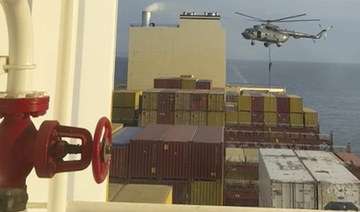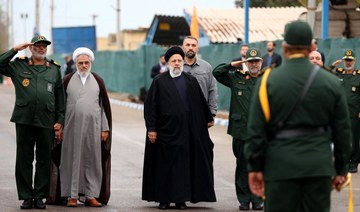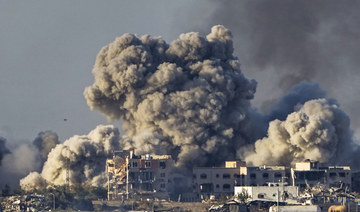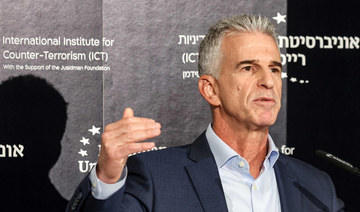ANKARA: Joint Turkish-Russian patrols in a rebel-held area of Syria were met with protests on Monday.
The troops last week completed their third round of patrols on the strategic M4 highway that runs across the country’s northwestern Idlib province, but there is anger about the patrols and the presence of pro-regime Russian troops in Syria.
Turkish riot police deployed to Idlib dispersed demonstrators with teargas, enlisting the help of fighters from the armed group Faylaq Al-Sham.
Idlib, Syria’s last remaining rebel stronghold, became a scene of local fighting despite a March 5 cease-fire agreement signed between Turkey and Russia.
According to data from the US Institute for the Study of War, Turkey’s military buildup in northern Syria between Feb. 1 and March 31 of this year amounted to about 20,000 troops, especially on the frontlines against regime forces.
“There are people who are really frustrated and scared of the future, and they are being used by Hayat Tahrir Al-Sham (HTS).”
Navvar Saban, Omran Center for Strategic Studies
The uncertainty around the cease-fire means the joint patrols along the Aleppo-Latakia international highway (M4) have been hindered due to sit-ins by locals who oppose the passage of Russian troops through the rebel-controlled area.
Navvar Saban, from the Istanbul-based Omran Center for Strategic Studies, said the cease-fire had in a way prevented military ground operations from the regime and the Russians to give civilians an opportunity to focus on personal issues, especially the coronavirus pandemic.
“There are people who are really frustrated and scared of the future, and they are being used by Hayat Tahrir Al-Sham (HTS),” Saban told Arab News. “Turkey won’t have a direct clash with the civilians for the time being but, in the future, it will depend on the circumstances of the cease-fire with the strategic choices of the rebel groups who are deployed in the area.”
SPEEDREAD
Turkish riot police deployed to Idlib dispersed demonstrators with teargas, enlisting the help of fighters from the armed group Faylaq Al-Sham.
Saban added that local skirmishes may undermine the already fragile cease-fire, although the Syrian Response Coordination Group recently said that more than 100,000 Syrians had recently returned to towns in the Aleppo and Idlib countryside since the March 5 deal.
HTS and Turkey-backed rebel fighters had been arresting each other in Idlib to escalate tensions, although detainees have now been freed. The latest sit-in was believed to be organized by HTS-controlled local groups, and some militants have posted videos threatening to attack joint patrols.
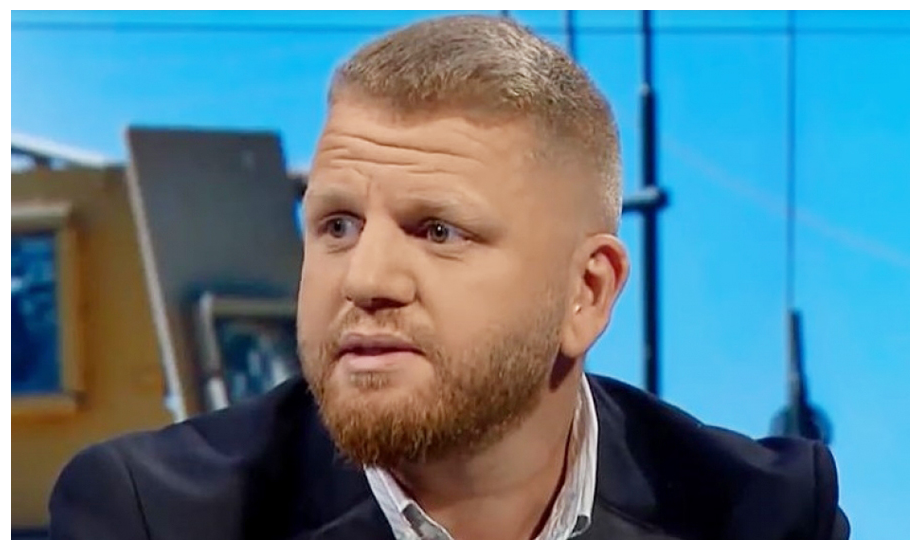
Navvar Saban, Omran Center for Strategic Studies
HTS has criticized the Turkish-Russia deal, said Emre Ersen, a Syria analyst from Marmara University in Istanbul.
“Up until very recently, HTS has carefully refrained from directly targeting Turkish troops in Idlib, but their rocket attack a few weeks ago which resulted in the killing of two Turkish soldiers around the M4 highway proves that HTS is willing to continue fighting for keeping control of Idlib despite Turkey’s agreements with Russia,” he told Arab News.
He said although Turkey’s influence over HTS seemed to be limited compared to its influence over other rebels in Idlib, Turkish mediation was probably the only reasonable option for the group, especially considering the determination of Russia and President Bashar Assad’s regime to launch a new large-scale military operation to take back the strategic town.
“This gives Turkey an incentive to exert its pressure over HTS, especially at a time when the coronavirus outbreak is currently posing a serious threat to all actors in Syria,” he added.
According to Jeff Mankoff, Senior Fellow for Russia at the Washington-based Center for Strategic and International Studies (CSIS), it seems that the protests against Turkish forces in Idlib have to do with concerns that the joint Russo-Turkish patrols authorized by last month’s ceasefire could lead to the erosion of the local autonomy built up over the course of the conflict.
“Even if Turkey’s relationship to various local forces, including HTS, has long been complicated, its military presence has helped secure Idlib against the return of the Assad regime and the Russians supporting it,” he told Arab News.
Following the Russia-Turkey ceasefire and the start of joint patrols, Mankoff added, people in Idlib are increasingly concerned that the Turks’ calculation could change, and that Ankara could strike some kind of deal with Moscow that would see it pull back from Idlib or allow the Russians in, in a way that would lay the groundwork for bringing the remaining rebel-held pocket in Idlib back under regime control.













